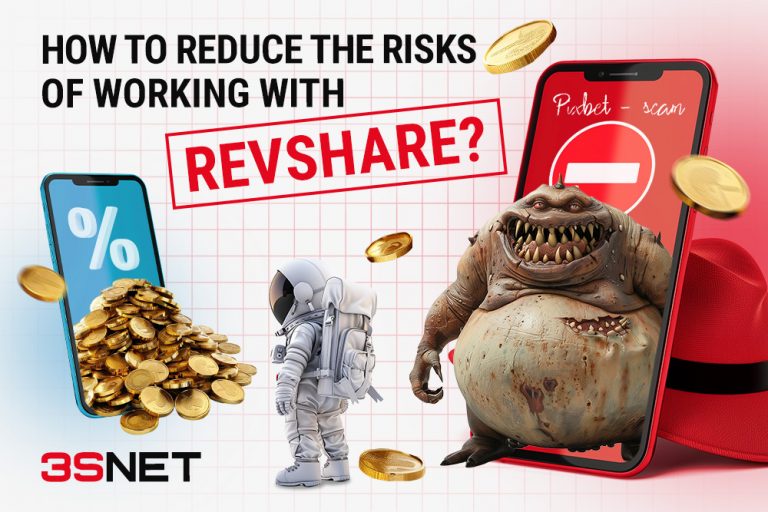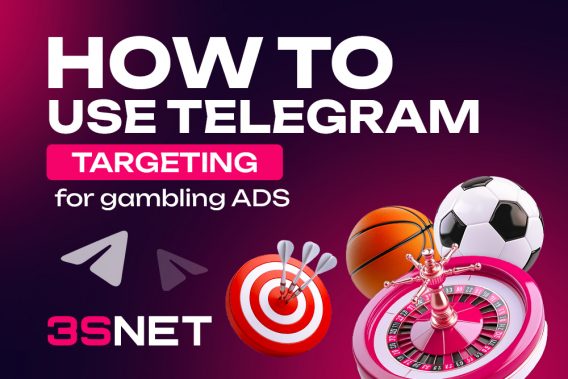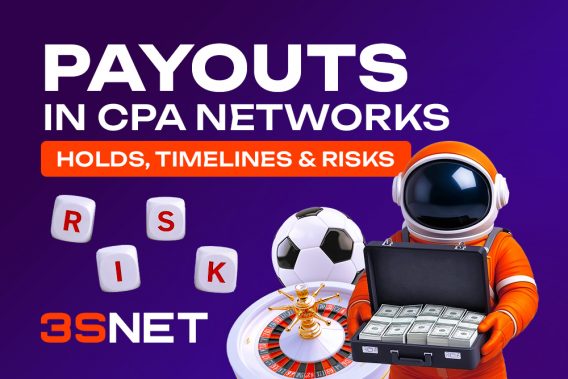
Publication date: 4 June 2024
There is always something new happening in the world of affiliate marketing: new tools and sources appear, algorithms change, new GEOs become relevant. But one thing must remain unchanged: honest partnerships between advertisers and professionals who deliver traffic to their sites. And the most important thing is payment within the framework of preliminary agreements. The new material on 3S.INFO describes the problem that can arise when cooperating on the RevShare model.
- Let’s briefly remember what RevShare (RS) is? It is a payment model in which the affiliate who brought a new user to the site receives a percentage of the amount of losses of this player as payment.
Why is RevShare beneficial for advertisers and affiliates?
The RevShare model has several advantages. It is the model in which the maximum benefit can be obtained by both parties, since the payment depends on the traffic quality.
For its part, the affiliate is most interested in bringing a regular and active player to the site. Only in this case, when the user deposits and loses, the affiliate will receive his interest. RevShare is not a one-time payment, in theory an affiliate can get paid for a player for years.
Revshare is maximally profitable and advertisers: when you pay for this model, you can be sure of the quality of traffic. There is no need for a large one-time payment, and the interest is paid only on the amount of losses (that is, it does not require investment from the company’s budget).
It seems that with such a system of interaction everyone should be satisfied and continue profitable cooperation. But recently a new problem has appeared in affiliate marketing. With the existing preliminary agreements, the operator gradually begins to make changes in the rules and terms of payment. These changes begin to apply to the whole previous period and already delivered traffic.
How to realize that you are being cheated with RevShare?
The first and most common way to “cheat the affiliate” is to change the terms and conditions in various ways. For example, restrictions on the number of new players are introduced or the validity period of game accounts is reduced (up to 1-3 years after registration). As a result, players stay on the site and the advertiser continues to earn from them, while the affiliate is left without payments and forced to deliver more and more new visitors to the site.
If the affiliate refuses to cooperate, the operator can close his account altogether and confiscate the entire base of players previously brought in. Some brands believe that sharing is not necessary because the affiliate is not delivering traffic or is not delivering enough, and reduce the RevShare percentage to 0%, as Zenit partners do, for example.
The operator can also block (and then quietly unblock) some of the affiliate’s most profitable players for imaginary infractions. You may be told that your players did not pass the KYC process, or that the security/anti-fraud department made such a decision and the manager has no detailed information.
The second common situation is when a gambling operator does not change anything on the old brand, but stops supporting the project and it gradually dies out. At the same time, a new site is opened under the new brand, where the base of the old is added, and all players are voluntarily transferred to the new site. Wagering conditions are introduced, admin fee is increased. Finally, payments to webmasters “from the old brand” stop, although the advertiser has only changed the signboard.
The sad story of 2023-24 world class is the big scandal with the brand Pixbet, which defrauded many affiliates of millions of euros. It closed its current legal entity and opened a new one, obtaining a license for it. No old legal entity – no payouts. And with the old brand and the huge base of players already received, it allegedly has nothing to do with it. The PIXBET brand has 100% chances to earn the title of “The biggest scam of 2024” and “The main anti-recommendation to work on any model!
A third way to pay less is to increase administrative fees. Some unscrupulous advertisers even include the purchase of toilet paper in the office in the admin fee. You should realize that a huge admin fee will significantly reduce your profits.
It makes sense that any unilateral changes to the terms and conditions are absolutely illegal. Nevertheless, operators take advantage of the fact that affiliates with low traffic volume do not have the resources for expensive and lengthy lawsuits.
As a result, the current situation leads to mutual mistrust, complication of market interaction, fraud attempts, distrust of brands and long inspections. Meanwhile, affiliates increasingly prefer to work under the CPA scheme and, although one-time, but guaranteed payment.
What to do with RevShare?
Now the main question is what to do? Is there a way to work honestly and safely with RevShare? Here are some tips from 3SNET:
- First of all, find out the terms and conditions and pin them in a chat with your manager.
- Don’t forget the offer contract where the working conditions are stated. Download it for yourself and keep it.
- Find out how the retention department works on the advertiser’s side. What kind of promotions will be offered to registered players, how often (monthly, quarterly, yearly, etc.) and through which channels.
- Negotiate and discuss the revshare formula, allowable admin fee, etc. Immediately exclude the situation when any bonuses, production of promotional materials can be added to the admin fee and reduce the affiliate’s profit.
- Establish a prohibition for the advertiser to conduct cross-promotion to its players with other brands. Alternatively, if the advertiser has several brands and plans to do so, demand to provide compensation or payment for the same RevShare on other projects.
NOTE! In our experience, most new projects die within the first year of existence. Working with newcomers to the market is risky. You should evaluate these risks, find out who owns the projects, how experienced and competent this team is in their field.
Who pays RevShare without changing the terms?
Based on 3SNET recommendations, we have compiled a list of advertisers with whom our affiliates have had no problems: Pin-Up, Vavada, Mostbet, MarathonBet, 1xBet, Melbet, Welcome Partners.
Share it with your friends via favorite social media




























